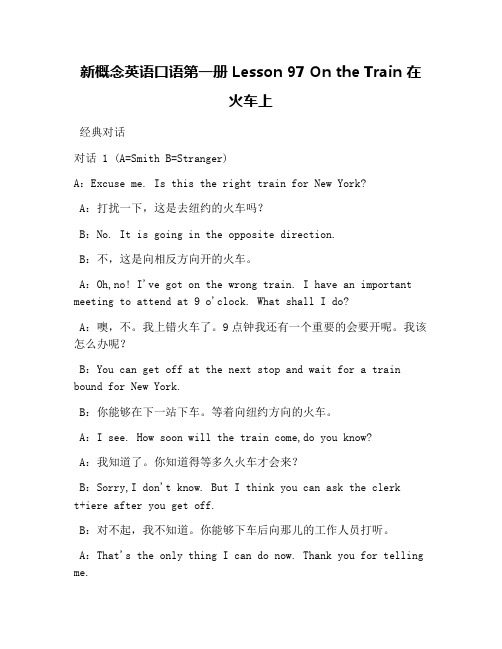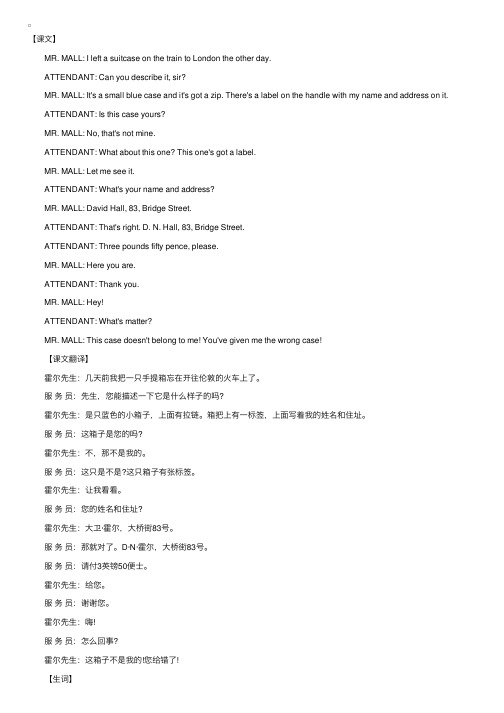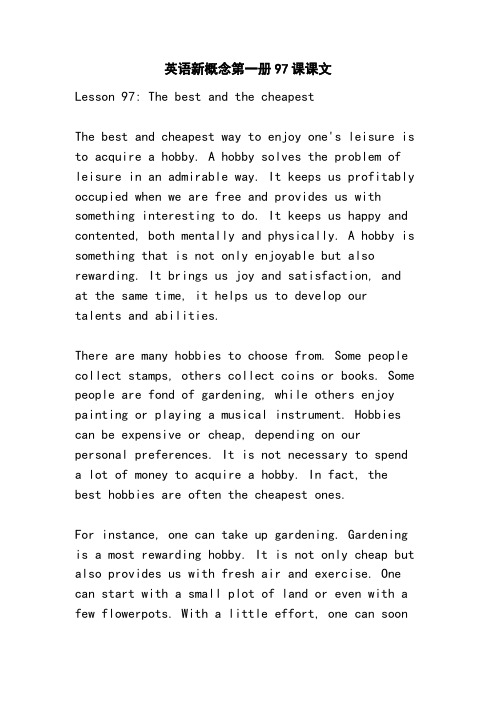裕兴新概念英语第一册笔记Lesson 97
新概念英语第一册Lesson92_97生词和短语

新概念英语第一册Lesson92~97生词和短语新概念英语第一册Lesson92生词和短语still /stil/ adv. 还,仍旧move /mu:v/ v. 搬家miss /mis/ v. 想念,思念neighbour /'neibә/ n. 邻居person /'pә:sәn/ n. 人people /'pi:pәl/ n. 人们新概念英语第一册Lesson93生词和短语pilot /'pailәt/ n. 飞行员return /ri'tә:n/ v. 返回New York /'nju:-'jɔ:k/ n. 纽约Tokyo /'tәukiәu/ n. 东京Madrid /mә'drid/ n.马德里fly /flai/ (flew /flu:/, flown /flәun/) v. 飞行新概念英语第一册Lesson94生词和短语Athens /'æθinz/ n. 雅典Berlin /bә:'lin/ n. 柏林Bombay /bɔm'bei/ n. 孟买Geneva /dʒi'ni:vә/ n. 日内瓦Moscow /'mɔskәu/ n. 莫斯科Rome /rәum/ n. 罗马Seoul /sәul/ n. 汉城Stockholm /'stɔkhәum/ n. 斯德哥尔摩Sydney /'sidni/ n. 悉尼新概念英语第一册Lesson95生词和短语return /ri'tә:n/n. 往返train /trein/ n. 火车platform /'plætfɔ:m/ n. 站台plenty /'plenti/ n. 大量bar /ba:/ n. 酒吧station /'steiʃәn/ n. 车站,火车站porter /'pɔ:tә/ n. 收票员catch /kætʃ/ (caught/kæ:tʃ/,caught) v.赶上miss /mis/ v. 错过新概念英语第一册Lesson96生词和短语leave /li: v/ (left/left/,left)v.遗留describe /di'skraib/ v.描述zip /zip/ n.拉链label /'leibәl/ n.标签handle /'hændl/ n.提手,把手address /ә'dres/ n.地址pence /pens/ n. penny的复数形式belong /bI'lɔŋ/ v.属于新概念英语第一册Lesson97生词和短语OW /a/ int. 哎哟slip /slip/ v.滑倒,滑了一脚downstairs /'dan'steәz/ adv.下楼hurt /hә:t/ (hurt, hurt) v.伤,伤害,疼痛back /bæk/ n.背stand up /'stænd-'ʌp/ 起立,站起来help /help/ v.帮助at once立即sure /ʃɔ:/ adj.一定的,确信的X-ray /'eks-rei/ n. X光透视。
新概念英语口语第一册 Lesson 97 On the Train 在火车上

新概念英语口语第一册 Lesson 97 On the Train 在火车上经典对话对话 1 (A=Smith B=Stranger)A:Excuse me. Is this the right train for New York?A:打扰一下,这是去纽约的火车吗?B:No. It is going in the opposite direction.B:不,这是向相反方向开的火车。
A:Oh,no! I've got on the wrong train. I have an important meeting to attend at 9 o'clock. What shall I do?A:噢,不。
我上错火车了。
9点钟我还有一个重要的会要开呢。
我该怎么办呢?B:You can get off at the next stop and wait for a train bound for New York.B:你能够在下一站下车。
等着向纽约方向的火车。
A:I see. How soon will the train come,do you know?A:我知道了。
你知道得等多久火车才会来?B:Sorry,I don't know. But I think you can ask the clerkt+iere after you get off.B:对不起,我不知道。
你能够下车后向那儿的工作人员打听。
A:That's the only thing I can do now. Thank you for telling me.A:这是我惟一能做的了。
谢谢你告诉我这些。
B:You are welcome.B:别客气。
对话 2A:Excuse me,I'd like some information about the train,please.A:打扰一下,我想打听一下火车信息。
新概念英语第一册课文翻译及学习笔记Lesson97

【课⽂】 MR. MALL: I left a suitcase on the train to London the other day. ATTENDANT: Can you describe it, sir? MR. MALL: It's a small blue case and it's got a zip. There's a label on the handle with my name and address on it. ATTENDANT: Is this case yours? MR. MALL: No, that's not mine. ATTENDANT: What about this one? This one's got a label. MR. MALL: Let me see it. ATTENDANT: What's your name and address? MR. MALL: David Hall, 83, Bridge Street. ATTENDANT: That's right. D. N. Hall, 83, Bridge Street. ATTENDANT: Three pounds fifty pence, please. MR. MALL: Here you are. ATTENDANT: Thank you. MR. MALL: Hey! ATTENDANT: What's matter? MR. MALL: This case doesn't belong to me! You've given me the wrong case! 【课⽂翻译】 霍尔先⽣:⼏天前我把⼀只⼿提箱忘在开往伦敦的⽕车上了。
服务员:先⽣,您能描述⼀下它是什么样⼦的吗? 霍尔先⽣:是只蓝⾊的⼩箱⼦,上⾯有拉链。
新概念英语第一册97课笔记

新概念英语第一册97课笔记摘要:一、前言二、新概念英语第一册97 课简介三、课文内容概括四、重点词汇与短语五、语法点解析六、课后练习答案与解析七、学习建议与总结正文:新概念英语作为学习英语的经典教材,一直受到广大英语学习者的喜爱。
本文将针对新概念英语第一册97 课进行学习笔记的整理。
新概念英语第一册97 课主要讲述了一个关于一位女士丢失钱包的故事。
在故事中,作者详细描述了女士丢失钱包的过程以及之后寻找钱包的经历。
通过这个故事,让学习者了解到英语中表示丢失物品以及寻找物品的常用表达。
课文中重点词汇与短语有:lose(丢失)、purse(钱包)、on the bus (在公交车上)、next to(在旁边)、find(找到)、police(警察)等。
这些词汇和短语对于初学者来说较为简单,但都是日常生活中常用的表达,需要熟练掌握。
在语法点方面,本课涉及到了一般过去时的使用。
一般过去时表示过去某个时间里发生的动作或存在的状态,通常与表示过去的时间状语连用。
例如:Ilost my purse on the bus yesterday.(昨天我在公交车上丢了钱包。
)课后练习答案与解析:1.答案:a) lost b) finding c) to find d) finds解析:根据句意,应该使用一般过去时,所以选a) lost。
2.答案:a) next to b) next c) nearest d) nearest to解析:根据句意,应该表示距离目的地最近的车站,所以选c) nearest。
3.答案:a) she b) they c) her d) theirs解析:根据句意,应该表示她的钱包,所以选c) her。
针对新概念英语第一册97 课的学习,建议学习者多读课文,积累常用词汇和短语,并掌握一般过去时的用法。
同时,课后练习要认真完成,以巩固所学知识。
裕兴新概念英语第一册笔记Lesson 97

Lesson 97leave 1)v. 遗留,遗忘--I left my notebook at my mother’s .我把笔记本忘在我母亲家了。
--He left his key in the classroom. 他把钥匙忘在了教室。
--leave 指知道东西忘在哪个地方 --lose 丢失(不知道丢失东西的地方)--leave 2)v. 离开--Remember to turn off the light when you leave. 当你离开的时候记得关灯。
--leave…for…离开(某地)前往--Is she leaving Pairs for New York? 她是不是要离开巴黎去纽约?--I am leaving for Shanghai tomorrow. 明天我要到上海去。
--leave 3)v.把…留下/ 留在…--You can leave your children at home.你可以把孩子留在家里。
--leave a message for sb 给…留个口信--Did he leave any messages for me? 他有话给我吗?--leave 4) v. 使…处于某种状态--Leave the door open. 让门开着吧。
--leave… alone 不管,不惹 --leave the bottle alone别再碰那个瓶子了--Leave him alone.别管他。
(让他去好了) --Leave me alone.别烦我了。
--leave 5)n. 准假,修假--ask for leave 请假 --a sick leave of three days 三天病假--take French leave 擅自离开,不辞而别describe v.描述,把…称为--Can you describe your suitcase? = What’s your suitcase like?--describe…as…把…说成--describe oneself as 把自己说成…--He describes himself as ambitious. 他称他自己是个雄心勃勃的人。
新概念英语lesson97

Lesson 97A small blue caseRebecca LeeReview车站的钟慢了十分钟。
The train station's clock is ten minutes slow.下一班车什么时候发车?When/ What time will the next train leave?我想买一张到北京的往返票,谢谢。
One return ticket to Beijing, please.英国西部总是雨水很充足。
There is plenty of rain in the western England. 我们有大量的蔬菜和水果。
We have plenty of/ a lot of vegetables and fruits.Review我们去游泳吧!Let's go and have a swim!书店隔壁有个邮局。
There is a post office next to the bookstore. 你最好早点上床睡觉。
You had better go to bed early.这个表快了两三分钟。
This clock is two or three minutes fast.他说他四年后会回来的。
He said that he would come back four years later.New words and expressions •leave (left, left) v. 遗留•describe v.描述•zip n.拉链•label n.标签•handle n.提手,把手•address n.地址•pence n.便士•belong v. 属于leave (left, left) v. 遗留•1)v. 离开•当你离开的时候记得关灯。
•Remember to turn off the light when you leave.•leave…for… 离开(某地)前往••明天我要到上海去。
新概念英语第一册课后题及答案:Lesson97-98

新概念英语第一册课后题及答案:Lesson97-98 Written exercises书面练习A Complete these sentences.模仿例句完成以下句子,选用适当的所有格代词。
Example:This dress belongs to my sister. It is hers.1 These things belong to my husband. They ______.2 This coat belongs to me. It ______ .3 These shoes belong to my wife. They ______ .4 These books belong to my brother and me. They ______ .5 These pens belong to Tom and Jill. The pens ______ .6 This suitcase belongs to you. It ______ .B Answer these questions.模仿例句回答以下问题。
Examples:Are these your keys?Yes, they're mine. They belong to me.Is this John's letter?Yes, it's his. It belongs to him.Are these my clothes?Yes, they're yours. They belong to you.1 Is this Jane's passport?2 Are these their tickets?3 Is this your watch?4 Are these her flowers?5 Is this my boat?6 Is this Jim's phrasebook?7 Are these hammers Frank's and Gary's?8 Is this our car?9 Are these the children's pens?答案:Lesson 98A1 They are his.2 It is mine.3 They are hers.4 They are ours.5 The pens are theirs.6 It is yours.B1 Yes, it's hers. It belongs to Jane.2 Yes, they're theirs. They belong to them.3 Yes, it's mine. It belongs to me.4 Yes, they're hers. They belong to her.5 Yes, it's yours. It belongs to you.6 Yes, it's his. It belongs to Jim.7 Yes, they're theirs. They belong to them.8 Yes, it's ours. It belongs to us.9 Yes, they're theirs. They belong to them.。
英语新概念第一册97课课文

英语新概念第一册97课课文Lesson 97: The best and the cheapestThe best and cheapest way to enjoy one's leisure is to acquire a hobby. A hobby solves the problem of leisure in an admirable way. It keeps us profitably occupied when we are free and provides us with something interesting to do. It keeps us happy and contented, both mentally and physically. A hobby is something that is not only enjoyable but also rewarding. It brings us joy and satisfaction, and at the same time, it helps us to develop ourtalents and abilities.There are many hobbies to choose from. Some people collect stamps, others collect coins or books. Some people are fond of gardening, while others enjoy painting or playing a musical instrument. Hobbies can be expensive or cheap, depending on our personal preferences. It is not necessary to spend a lot of money to acquire a hobby. In fact, the best hobbies are often the cheapest ones.For instance, one can take up gardening. Gardening is a most rewarding hobby. It is not only cheap but also provides us with fresh air and exercise. One can start with a small plot of land or even with a few flowerpots. With a little effort, one can soonhave a beautiful garden. Gardening not only givesus pleasure but also brings us closer to nature. It teaches us patience and perseverance.Another cheap hobby is reading. A good book can provide us with hours of pleasure and entertainment. It broadens our knowledge and enhances our imagination. Reading is a hobby that can be enjoyed by people of all ages. It is a great way to relax and unwind after a long day. Books can be borrowed from libraries for free, making it an affordable hobby for everyone.In conclusion, acquiring a hobby is the best way to make the most of our leisure time. It not onlykeeps us occupied but also brings us joy and satisfaction. Hobbies can be expensive or cheap, depending on our personal preferences. However, the best hobbies are often the cheapest ones. Gardening and reading are just a few examples of affordable hobbies that can provide us with endless enjoyment.。
- 1、下载文档前请自行甄别文档内容的完整性,平台不提供额外的编辑、内容补充、找答案等附加服务。
- 2、"仅部分预览"的文档,不可在线预览部分如存在完整性等问题,可反馈申请退款(可完整预览的文档不适用该条件!)。
- 3、如文档侵犯您的权益,请联系客服反馈,我们会尽快为您处理(人工客服工作时间:9:00-18:30)。
Lesson 97leave 1)v. 遗留,遗忘--I left my notebook at my mother’s .我把笔记本忘在我母亲家了。
--He left his key in the classroom. 他把钥匙忘在了教室。
--leave 指知道东西忘在哪个地方 --lose 丢失(不知道丢失东西的地方)--leave 2)v. 离开--Remember to turn off the light when you leave. 当你离开的时候记得关灯。
--leave…for…离开(某地)前往--Is she leaving Pairs for New York? 她是不是要离开巴黎去纽约?--I am leaving for Shanghai tomorrow. 明天我要到上海去。
--leave 3)v.把…留下/ 留在…--You can leave your children at home.你可以把孩子留在家里。
--leave a message for sb 给…留个口信--Did he leave any messages for me? 他有话给我吗?--leave 4) v. 使…处于某种状态--Leave the door open. 让门开着吧。
--leave… alone 不管,不惹 --leave the bottle alone别再碰那个瓶子了--Leave him alone.别管他。
(让他去好了) --Leave me alone.别烦我了。
--leave 5)n. 准假,修假--ask for leave 请假 --a sick leave of three days 三天病假--take French leave 擅自离开,不辞而别describe v.描述,把…称为--Can you describe your suitcase? = What’s your suitcase like?--describe…as…把…说成--describe oneself as 把自己说成…--He describes himself as ambitious. 他称他自己是个雄心勃勃的人。
Zip n.拉链 zip code = post code 邮政编码label n. 标签 --attach a label to…在…上标签--The girl is attaching a label to her luggage. 这个女孩正在往她的行李上贴标签。
--tag n.标签(写有名称,地址,号码及定价等的牌子) --a price tag 价目标签A shipping tag 货运标签handle1) n. 提手,把手 --the handle of a kettle 茶壶的把手--The handle of my suitcase is broken. 我手提箱的把手坏了。
2)v. 触,摸,拿,弄--Wash your hands, then handle the chopsticks.先洗手,然后再拿筷子。
3)v. 处理,管理,对待--The boy is too young to handle this problem.这个小男孩太年轻不能处理这个问题。
--You should learn how to handle people. 你应该好好学习怎样对待别人。
4)v. 经营--This shop handles paper and stationery. 这家店经营纸张和文具。
address1) n. 地址 --the return address 回信地址2)n.演说,讲话give an opening address/make an opening address/deliver an opening address致开幕辞 Deliver an closing address致闭幕词 --address of welcome 欢迎辞3)v. 在…上写地址,致函…--Address the mail to Mr. Smith. 请把这个邮件寄给Smith先生。
4)v. 向…发表讲话Addressee 收信人 addresser发信人pence (penny的复数形式)便士belong1)v. 属于--The house belongs to me. 这个房子属于我。
--Who do these bags belong to? 这些包是谁的?2)是…的一员--He belongs to a golf club. 他是高尔夫俱乐部的一员。
Question: Does Mr. Hall get his case back?I left a suitcase on the train to London the other day.--left是leave的过去式,表示“遗忘,丢了”,通常与表示地点的短语连用。
--I left my glasses in the classroom. 我把我的眼镜忘在教室里了。
--Don’t leave your umbrella in the library. 别把伞忘在图书馆里。
--the other day “几天前”一般与过去时连用 --the other morning 几天前的上午--the other week 几周前 the other afternoon--the other month 几月前 the other eveningThe other year 几年前 the other nightCan you describe it , sir?--describe v. 描述--It’s hard to describe my feeling with words. 很难用语言描述我的心情。
Can you describe the man?你能描述一下那个男子么?It’s a small blue case and it’s got a zip. There’s a label on the handle with my name and address on it.It’s got a zip. 它有一个拉链。
--It’s= it has --has got=has 有--with my name and address on it --with prep.--my name and address作with的宾语“with…+介词短语”表示伴随情况--A girl is standing in the street with a rose in her hand. 一个女孩手里拿着一支玫瑰站在街上。
Our teacher comes in with some chalk in her hand.我们老师手里拿着几根粉笔进来了。
Is this case yours?= Is this your case?--yours是名词性物主代词,后面不接宾语。
在这里相当于your case.No, that’s not mine.--mine名词性物主代词,相当于my case.What about this one? This one’s got a label.--what about…相当于how about…多用于征求意见--What about going out for a walk? 出去散散步怎么样?--How about going shopping this weekend?--This one’s got a label.=This one has got a label.Let me see it.= Let me have a look at it.Let me see. 让我想一想--Where have you put your passport? 你把护照放在哪儿?--Let me see. Ah, in my handbag. 让我想想,啊!在我的手提包里。
What is your name and address?David Hall, 83, Bridge Street.英语国家的地址按照从小到大的顺序排列,和中国的相反。
--No. 83 Bridge Street. 大桥街83号--No. 102, Guanghua Road, Chaoyang Distric, Beijing, China 中国北京市朝阳区光华路102号街道:Street (缩写St.) 路:Road (缩写Rd.) 区:District (缩写Dist.)Three pounds fifty pence, please--three pounds 3英镑(注意pound用复数形式)--fifty pence 50 便士(pence是penny的复数形式)What’s the matter? =What’s wrong? 怎么回事?This case doesn’t belong to me! You’ve given me the wrong case!--belong to…属于某人--belong是实义动词,否定式需用助动词。
--given是give的过去分词。
现在完成时态强调动作结果。
Wrong right小结:--leave sth …把某物忘在…--the other day 几天前--with…+介词短语(做伴随状态)--What’s the matter? 怎么了?--belong to…属于…注意英语国家的地址写法:从小到大的顺序。
